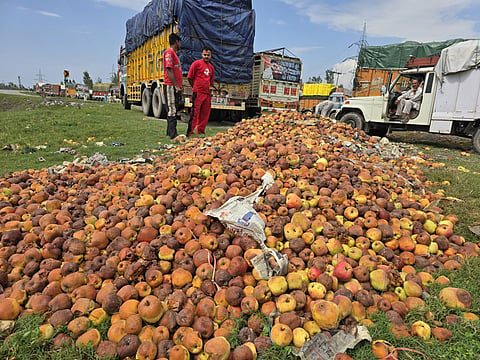

Fourteen-day shutdown of NH-44 strands over 2,000 trucks carrying apples worth crores
Nearly half the fruit has rotted, collapsing prices and leaving growers in debt
Orchardists, traders and MLAs protest, demanding swift compensation and inquiry
Highway closures a recurring crisis: 284 days of disruption in the past seven years
Experts warn poor maintenance and overexploitation make NH-44 dangerously fragile
The closure of Srinagar-Jammu NH-44 highway for 14 days following heavy rains and flash floods has left Kashmir’s fruit industry — a vital economic sector for the region — in crisis, exposing the fragility of a highway repeatedly battered by landslides. With truckloads of fruit rotting and prices collapsing, growers are demanding compensation and accountability.
The reopening of the highway on September 16, 2025 brought only temporary relief, said Abdul Rashid Mir from south Kashmir’s Anantnag district, a well-known apple grower and president of the Fruit Growers and Dealers Association at Jablipora fruit mandi in Bijbehara.
“More than 2,000 trucks loaded with apples from across the Valley were stranded at multiple locations on the highway. Of these, 700 to 800 trucks had left from Jablipora mandi. Around half the fruit in these trucks has been damaged,” Mir told Down To Earth (DTE).
Each truck carried 1,200-1,300 boxes of apples, weighing between 14 and 19 kilogrammes each. Sorting out the rotten fruit is laborious, as every box will need to be reopened and repacked, said Mir.
Dealers told DTE that losses extended beyond the stranded consignments, with harvested apples piled up in orchards also spoiling because they could not be transported in time. Rotting fruit could be seen dumped around mandis and along NH-44.
“A box that would have fetched us Rs 1,500-2,000 now cannot even be sold for Rs 500. The Srinagar-Jammu highway has become a nightmare from August to September every year during the monsoon, which coincides with apple harvesting,” Mir said.
Mir questioned the delay by National Highways Authority of India in reopening the highway. “Earlier closures lasted a day or two, but this time the road remained blocked for nearly a fortnight. What is the National Highways Authority of India doing? Where is their technology? We pay taxes such as road tax too; the government must compensate us for these losses,” he said.
The 270 kilometre Srinagar-Jammu highway is a lifeline for Kashmir’s economy but is frequently damaged by landslides, especially on the 35 km stretch between Banihal and Ramban. In March and April this year, the road was blocked for weeks after massive landslides in the area. In early September, however, damage occurred around Jakheni and Thard in Udhampur district, which was an unusual location for such disruption.
On September 9, 2025, Lieutenant Governor Manoj Sinha visited the damaged sites to take stock of the situation. Chief Minister Omar Abdullah also toured sections of the highway after traffic was completely restored on September 17.
On social media platform X (formerly Twitter), Abdullah said he had spoken to Union Minister for Highways Nitin Gadkari and conveyed the frustration of apple growers and traders, urging that the road be reopened quickly.
Over the past week, orchardists and traders held several protests demanding the reopening of the highway. On September 15, Bashir Veeri, the Member of Legislative Assembly (MLA) from Bijbehara, joined demonstrators at Jablipora mandi.
“The highway has been thrown open but it was too late — apples have rotted in the last fortnight as trucks stood stranded in warm temperatures,” Veeri told DTE. “Swift action must be taken to prevent further losses to the fruit industry and a probe is needed to find out why there was such a long delay in restoring the road. The government must pay compensation to affected farmers and traders.”
Workers of the Awami Ittehad Party, led by MLA Sheikh Khursheed, had staged a protest in Srinagar on September 16, 2025, demanding that movement of heavy vehicles like apple trucks be restored on the highway. The protestors carried placards reading “Save Apple, Save Kashmir.”
Khursheed said the blockade had placed Kashmir’s economy “under siege,” adding: “Horticulture sustains hundreds of thousands of families in the Valley. With the highway choked and fruit rotting in trucks, apple growers are starving.”
Figures underline the scale of the problem. In the past seven years, NH-44 has remained closed for 284 days, according to Srinagar-based journalist Arif Shafi Wani.
“In 2020 alone, the highway was shut for 47 days; in 2022 for 41 days; in 2021 for 23 days; and in 2023 for 58 days. This year, until mid-September, traffic had already been suspended for 26 days,” Wani told DTE. “The way the highway is being maintained by NHAI and its contractors is unacceptable and warrants a probe.”
Professor MA Malik, former head of the geology department at Jammu University, pointed to structural weaknesses behind the repeated closures.
“The highway has been overexploited through excessive earth cutting, blasting and tunnelling,” Malik told DTE. “Its carrying capacity is not that high. Heavy vehicles, specially the 16-tyre trucks, cause vibrations that destabilise the loose soil, particularly in the Udhampur-Ramban stretch. Rains and flash floods aggravate the situation, triggering landslides. The government must restrict traffic to smaller six- or ten-tyre trucks to protect the highway from further destruction.”